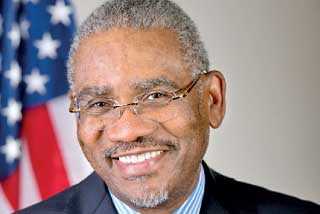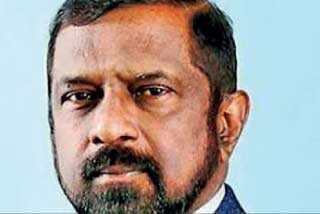Monday Feb 23, 2026
Monday Feb 23, 2026
Friday, 29 January 2021 00:38 - - {{hitsCtrl.values.hits}}

UN High Commissioner for Human Rights Michelle Bachelet

US House of Representatives Foreign Affairs Committee Chair Gregory Meeks

Human Rights Watch Geneva Director John Fisher

Foreign Secretary Admiral Prof. Jayantha Colambage
The Government could face an uphill battle in Geneva next month, after a scathingly critical report by UN High Commissioner for Human Rights Michelle Bachelet drew support from victims and activists, and states pushing for reconciliation and accountability in Sri Lanka vowed to explore “alternative options” if domestic efforts continued to fall short.
In a 17-page report on Sri Lanka released by her Office on Wednesday, High Commissioner Bachelet points to early warning signs for the recurrence of grave human rights violations in Sri Lanka and urges ‘strong preventative action’ and monitoring from the international community.
“Sri Lanka’s current trajectory sets the scene for the recurrence of the policies and practices that gave rise to grave human rights violations,” the High Commissioner said.
Among the early warning signals for a recurrence of grave violations, the report highlights the accelerating militarisation of civilian governmental functions, reversal of important constitutional safeguards, political obstruction of accountability, exclusionary rhetoric, intimidation of civil society, and the use of anti-terrorism laws.
Foreign Secretary Jayantha Colambage dismissed the Report out of hand as “unsubstantiated accusations against Government officials” and urged the UN to follow established international procedures “if they have something”.
But High Commissioner Bachelet concluded that the Human Rights Council was “once again at a critical turning point in its engagement with Sri Lanka”.
Twice before, the Council had lent support to domestic accountability and reconciliation initiatives, culminating in Resolution 30/1, the Report of the High Commissioner said.
“The Government has now demonstrated its inability and unwillingness to pursue a meaningful path towards accountability for international crimes and serious human rights violations and signalled instead a fundamentally different approach which focusses on reparation and development, but threatens to deny victims their rights to truth and justice and further entrench impunity,” the High Commissioner concluded.
UN Human Rights Chief Michelle Bachelet is a former President of Chile, and torture survivor under the brutal military dictatorship of Augusto Pinochet. Bachelet’s Report to the Human Rights Council pleaded with the international community to heed the cries of victims in Sri Lanka.
“I urge the international community to listen to the determined, courageous, persistent calls of victims and their families for justice, and heed the early warning signs of more violations to come,” the High Commissioner said, calling for “resolute measures” by UN member states.
The High Commissioner urged member states to use “targeted sanctions, asset freezes and travel bans” against alleged perpetrators of grave human rights abuses in Sri Lanka and urged states to use their national courts to pursue prosecutions.
For the first time in the history of Sri Lanka’s engagement with the Human Rights Council, the UN Human Rights Chief has also called on member states to pursue the option of referring Sri Lanka to the International Criminal Court, based in The Hague and set up to prosecute war crimes and crimes against humanity.
Human Rights experts pointed to conclusions in the High Commissioner’s report which states that Sri Lanka “has demonstrated its inability and unwillingness” to pursue accountability for international crimes, explaining that it was the ‘legal standard’ for intervention by the International Criminal Court.
The referral to the ICC must be made by the UN Security Council because Sri Lanka is not a signatory to the Rome Statute which established the Court. China and Russia are permanent members and hold veto power over matters that come before the Security Council.
Slamming the Presidential Commission set up to investigate alleged political victimisation, Bachelet said the Commission had “undermined” Police investigations and court proceedings related to several high-profile human rights and corruption cases. Referencing the arrest of former CID Director SSP Shani Abeysekera, the High Commissioner said he had led investigations into several emblematic human rights cases.
“While the criminal justice system in Sri Lanka has long been the subject of interference, the current Government has proactively obstructed or sought to stop ongoing investigations and criminal trials to prevent accountability for past crimes,” the report states.
She called on member states to act to establish a mechanism to preserve evidence from key human rights cases in Sri Lanka, including the murder of 17 aid workers from a French NGO in 2006 and the assassination of Sunday Leader Editor Lasantha Wickrematunge in January 2009.
UN High Commissioner for Human Rights Michelle Bachelet stressed that the failure to deal with the past continues to have devastating effects on tens of thousands of family members from all communities who persist in seeking justice, reparations – and the truth about the fate of their loved ones.Rights activists hoped Bachelet’s stinging rebuke of the Government and its human rights trajectory would lead to a strong resolution on Sri Lanka at the upcoming UNHRC session in Geneva. The UK is leading the effort to adopt a fresh resolution at the Council which will urge Sri Lanka to pursue post-war justice and reconciliation.
Geneva Director for Human Rights Watch John Fisher told Reuters that Bachelet’s Report laid bare Sri Lanka’s record of “complete impunity” for appalling crimes under international law, and the very alarming developments under the current Government.
US House of Representatives Foreign Affairs Committee Chair Gregory Meeks reacted to the High Commissioner’s Report on Sri Lanka, saying he shared her concerns. “If the Government is unwilling to consider enacting the report’s recommendations, the US and its partners must explore alternative options as laid out by High Commissioner Michelle Bachelet,” Representative Meeks noted.
Canadian Minister of Foreign Affairs Marc Garneau also tweeted that Bachelet’s report on Sri Lanka underscored the importance of a steadfast commitment to reconciliation and accountability. “Canada continues to support efforts to ensure accountability, peace and reconciliation in the island,” Garneau added.
